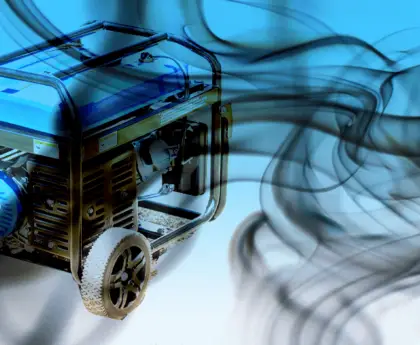Choosing the right generator for your food truck is crucial to keep your business running smoothly. This decision impacts not only the performance of your kitchen appliances but also affects noise pollution and fuel efficiency. So, what should you consider when looking for a Food truck generator?
When considering a food truck generator, look for a portable generator with enough power, compact size, low noise, and easy start-up. Consider fuel type, run time, safety features, warranty, and support. Price matters, but prioritize low noise, quality and reliability.
In this article, we’ll guide you through all aspects of selecting a food truck generator from understanding different types to factors like wattage requirements, size, and noise levels.
Come along with us as we power up your journey towards finding the perfect generator for your mobile culinary venture!
Types of Food Truck Generators
There are three main types of food truck generators: inverter generators, portable generators, and built-in generators.
Inverter Generator
An Inverter Generator stands out as a top choice for food truck owners due to several key advantages. This type of generator operates smoothly and quietly, making it an excellent option for bustling street food environments where noise minimization is essential.
Unlike conventional generators, inverter generators have the ability to adjust the electrical output to match the power demand. This feature not only reduces fuel consumption but also allows longer operation time which is beneficial during long working hours on your food truck business.
Another notable benefit of using an inverter generator resides in their compact size and lighter weight compared to other types of generators, offering ease of handling and portability – often a crucial factor when space is at a premium in your mobile kitchen setup.
One last point worth mentioning remains: most models come with advanced technology that delivers clean power safe for sensitive appliances such as cash registers or delicate kitchen equipment which helps prevent damage from voltage fluctuations.
Portable Generator
A portable generator is a popular choice for food trucks due to its convenience and versatility. These generators are designed to be easily transported and provide power on the go.
With different sizes and wattage options available, you can find a portable generator that meets your specific power requirements. It is important to consider factors such as noise levels, fuel efficiency, and ease of installation when choosing a portable generator for your food truck.
Additionally, dual fuel generators allow you the flexibility to choose between different types of fuel depending on availability and circumstances. Whether you’re running a small food cart or a full-sized mobile kitchen, a portable generator can ensure that all your equipment runs smoothly while you serve up delicious street food.
Keep in mind that finding a quiet operating generator is essential to create an enjoyable dining experience for your customers while minimizing noise pollution in the surrounding area.
Diesel generators are also commonly used in food trucks due to their reliability and fuel efficiency. Make sure to accurately determine the power needs of your food truck by listing all the appliances and calculating their total consumption wattage.
Built-In Generator
A built-in generator is a type of food truck generator that is permanently installed within the vehicle. It provides a convenient and reliable source of power for the equipment in your food truck.
With a built-in generator, you don’t have to worry about carrying around a separate portable generator or dealing with fuel storage. The generator can be integrated seamlessly into the design of your food truck, ensuring that it doesn’t take up valuable space.
Additionally, a built-in generator can be wired directly to your electrical system, making it easy to power all of your appliances efficiently and effectively. When choosing a built-in generator for your food truck, consider factors such as power requirements, noise levels, and fuel efficiency to ensure that you select the right option for your specific needs.
Factors to Consider When Choosing a Food Truck Generator
When choosing a food truck generator, consider factors such as power requirements, size and portability, noise levels, fuel efficiency, emissions, and installation and ventilation.
Power requirements
Choosing the right generator for your food truck involves considering the power requirements of your equipment. It is crucial to determine the number and wattage of appliances that will be running simultaneously in order to select a generator with sufficient power output.
This will ensure that all your cooking, cooling, and other electrical needs are met efficiently. By accurately calculating your power consumption, you can choose a generator that can handle the load without any issues or limitations.
Size and portability
The size and portability of a food truck generator are important factors to consider when choosing the right one for your business. Since space is limited in a food truck, it’s essential to select a generator that doesn’t take up too much room.
Look for compact models that can easily fit into the available space without causing any inconvenience. Additionally, portability is crucial as you may need to move the generator around frequently.
Opt for generators with wheels or handles that make transportation hassle-free and allow you to position it wherever needed. Finding a balance between size and portability ensures that your generator fits comfortably in your food truck while still being easy to maneuver when necessary.
Noise levels
Consider the noise levels of a generator when choosing one for your food truck. It is important to find a generator that operates quietly to avoid excess noise pollution in and around your mobile kitchen.
This will help create a more pleasant dining experience for your customers and prevent any disruptions in busy urban areas or residential neighborhoods. Look for generators specifically designed with low decibel ratings, ensuring they won’t disturb the peace while you serve up delicious street food.
Fuel efficiency
Consider the fuel efficiency of a food truck generator when making your choice. Fuel costs can add up over time, so it’s important to select a generator that is efficient in its fuel consumption.
Look for generators that are designed to optimize their power output while minimizing fuel usage. Diesel generators are known for their fuel efficiency and are often preferred by food truck owners.
Additionally, dual fuel generators allow for flexibility in choosing between different types of fuels, which can help further maximize efficiency and reduce costs. By prioritizing fuel efficiency, you’ll be able to save money in the long run and ensure smooth operation of your food truck business.
Emissions
Consider the emissions produced by the food truck generator before making your final decision. It’s important to choose a generator that meets environmentally friendly standards and does not emit harmful pollutants into the air.
Look for generators with low emissions ratings, such as those that are EPA or CARB compliant. By choosing a generator with lower emissions, you can contribute to a cleaner environment while running your food truck business efficiently.
Installation and ventilation
Proper installation and ventilation are crucial when it comes to setting up a food truck generator. The generator should be securely installed to ensure stability and prevent any accidents while the vehicle is in motion.
It is important to follow the manufacturer’s instructions for installation, or hire a professional if needed. Ventilation is also essential as generators emit exhaust fumes that need to be safely expelled from the enclosed space of the food truck.
Adequate ventilation helps prevent carbon monoxide buildup, ensuring the safety of both customers and staff inside the food truck. By paying attention to these aspects of installation and ventilation, you can effectively set up your food truck generator for optimal performance and safety.
Recommended Food Truck Generators
Here are some top picks for food truck generators that you should consider. Read on to find the perfect generator for your mobile kitchen.
Westinghouse WGEN7500
The Westinghouse WGEN7500 is a highly recommended generator for food trucks. With a powerful 7500-watt capacity, it can easily handle the energy needs of multiple appliances in your mobile kitchen.
This portable generator runs on gasoline and has a long run time, making it ideal for all-day operations without worrying about refueling. It also features low noise levels, ensuring that your customers won’t be disturbed by the generator’s operation.
The Westinghouse WGEN7500 is known for its durability and reliability, both important factors when choosing a generator for your food truck business.
Honda 7000W
The Honda 7000W generator is a reliable and powerful option for food truck owners. With its 7000-watt capacity, it can easily power multiple appliances in your mobile kitchen. The Honda brand is known for its durability and performance, making it a top choice among food entrepreneurs.
Additionally, the Honda 7000W generator operates quietly, minimizing noise pollution both inside the food truck and in its surroundings. Its fuel efficiency ensures that you can run your business without constantly worrying about refueling.
When selecting a food truck generator, consider the Honda 7000W for its power and reliability to keep your operations running smoothly.
Briggs & Stratton 30675A Q6500
The Briggs & Stratton 30675A Q6500 is a highly recommended generator for food trucks. This portable generator offers reliable power and efficient performance. With a maximum wattage of 6,500 watts, it can easily handle the power requirements of most food truck equipment.
The Q6500 is known for its quiet operation, making it an excellent choice to minimize noise pollution in your food truck and its surroundings. Additionally, this generator features a fuel-efficient engine that allows for longer run times, perfect for busy days at the food truck festival or during catering events.
Overall, the Briggs & Stratton 30675A Q6500 provides the power and reliability that every food truck owner needs to keep their business running smoothly.
Pulsar Products PG5250B
The Pulsar Products PG5250B is a recommended generator for food trucks. With its portable design and reliable power output, it is an ideal choice for mobile kitchens. This generator has a wattage of 5,250, which provides sufficient power to run multiple appliances in your food truck.
It also features a convenient recoil start and operates quietly, ensuring minimal noise disturbance while serving your customers. The Pulsar PG5250B is known for its durability and fuel efficiency, making it a top pick for food truck owners looking for a dependable generator option.
Champion 3400W
The Champion 3400W generator is a top pick for food trucks due to its portability, power, and reliability. With its 3400-watt output, it can easily handle the energy requirements of most food truck appliances.
This generator is also known for being fuel-efficient and having a long run time, allowing you to focus on serving customers instead of constantly refueling. Additionally, the Champion 3400W operates at a relatively quiet noise level, ensuring that your cooking space remains comfortable and peaceful.
Its compact design makes it easy to transport and store in your food truck without taking up too much valuable space. Overall, the Champion 3400W is an excellent choice for any food truck owner looking for a reliable generator to power their business.
Determining the Power Needs for Your Food Truck
To ensure your food truck has enough power to operate all of its equipment, you need to determine the specific power requirements for each item. Let’s dive into the details and find out how much wattage you’ll need!
List the equipment and their power requirements
The power requirements for a food truck generator will depend on the equipment you have in your mobile kitchen. Here are some common appliances and their approximate power needs:.
1. Refrigerator: A standard refrigerator can require around 800-1200 watts of power.
2. Freezer: A freezer typically needs about 1200-1500 watts to operate properly.
3. Food warmer or steam table: These devices may need around 1000-2000 watts, depending on the size and capacity.
4. Griddle or flat-top grill: A small griddle usually requires approximately 1500-2000 watts while larger ones can go up to 5000 watts.
5. Deep fryer: The wattage for a deep fryer generally ranges from 1800 to 3500 watts, depending on its size and power rating.
6. Oven or range: Small countertop ovens usually run between 1400-1800 watts, while larger oven ranges can reach up to 6000+ wattages.
Calculate the total power consumption
To determine the total power consumption for your food truck, you will need to make a list of all the equipment that will be running on the generator. Consider appliances like refrigerators, freezers, grills, fryers, and heating elements.
Check their power requirements (in watts) either in the user manual or on the appliance itself. Add up these wattage values to get the total power consumption needed for your food truck.
This calculation is crucial in selecting a generator with sufficient wattage capacity to meet your business needs without overloading the system.
Food Truck Generator FAQs
What factors should I consider when choosing a food truck generator?
When choosing a food truck generator, you should consider the power output and capacity required to run your equipment, fuel efficiency, noise level, size and weight for easy installation and transportation, as well as the reliability and durability of the generator.
How do I determine the power output needed for my food truck generator?
To determine the power output needed for your food truck generator, calculate the total wattage of all your electrical appliances and equipment that will be running simultaneously. Ensure that the generator you choose can handle this load without overloading or tripping its circuit breakers.
Which type of fuel is best for a food truck generator?
The best type of fuel for a food truck generator depends on various factors such as availability, cost, convenience, and environmental impact. Common options include gasoline, diesel, propane (LPG), or natural gas (CNG). Consider factors such as storage space onboard your food truck and emissions regulations in your area.
Are there any noise restrictions or regulations I should be aware of when choosing a food truck generator?
Yes, there may be noise restrictions or regulations imposed by local authorities that you need to comply with when operating a food truck. When choosing a generator, look for models specifically designed for quiet operation or ones that offer sound insulation features to ensure compliance with noise regulations while maintaining customer satisfaction.
How Much on Average Does a Food Truck Generator Cost?
Food truck generators cost between $500-$3,000. Investing in a reliable one ensures uninterrupted power supply for cooking and refrigeration.
Conclusion
Truth is, choosing the right generator for your food truck is crucial to ensure smooth operations and efficient power supply. Consider factors such as power requirements, size, noise levels, fuel efficiency, and installation needs when making your decision.
With a variety of options available, it’s important to do your research and select a generator that meets the specific needs of your food truck business. By taking these factors into consideration, you can find the perfect generator to power your mobile kitchen and keep your culinary creations running smoothly.






